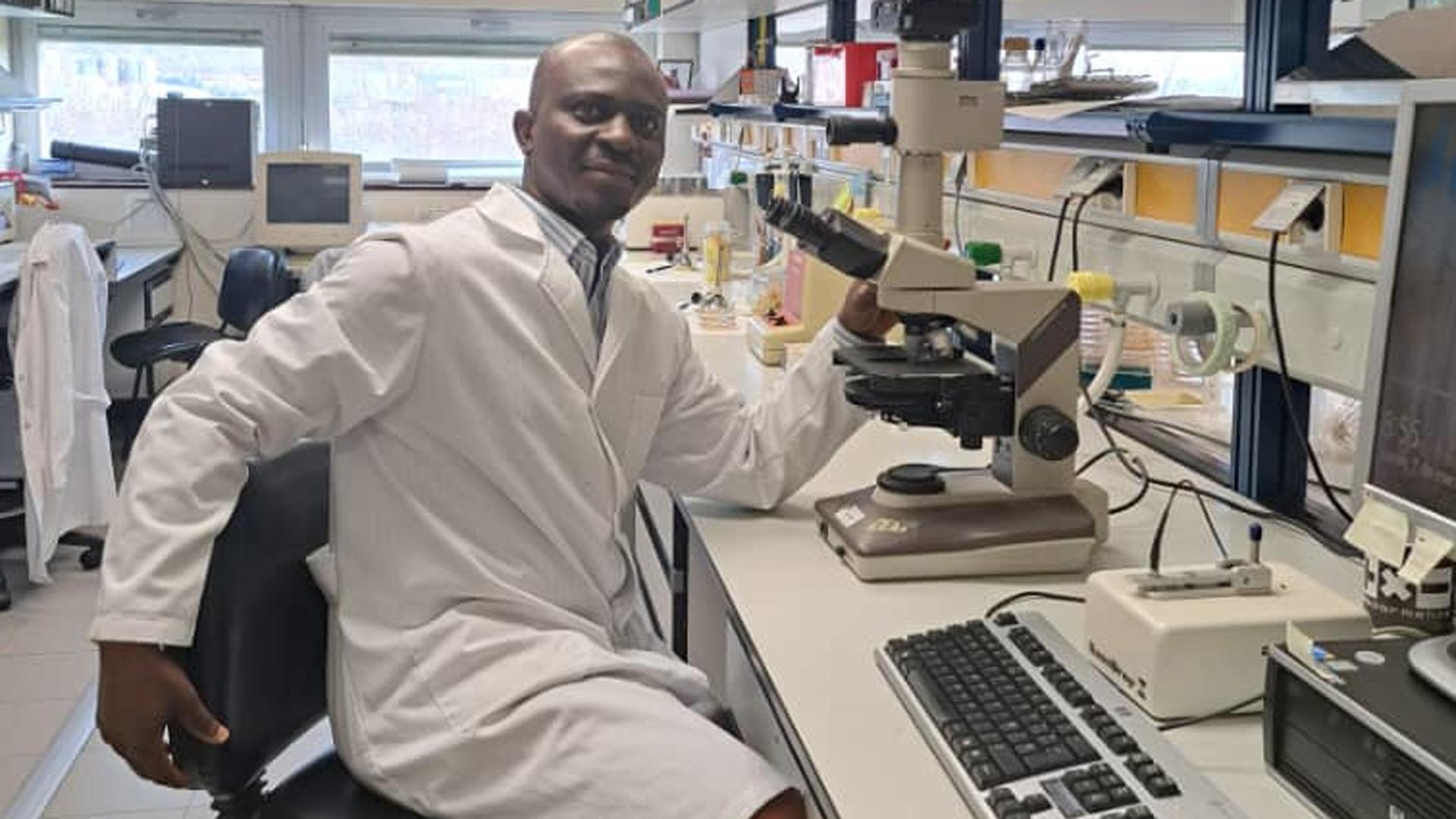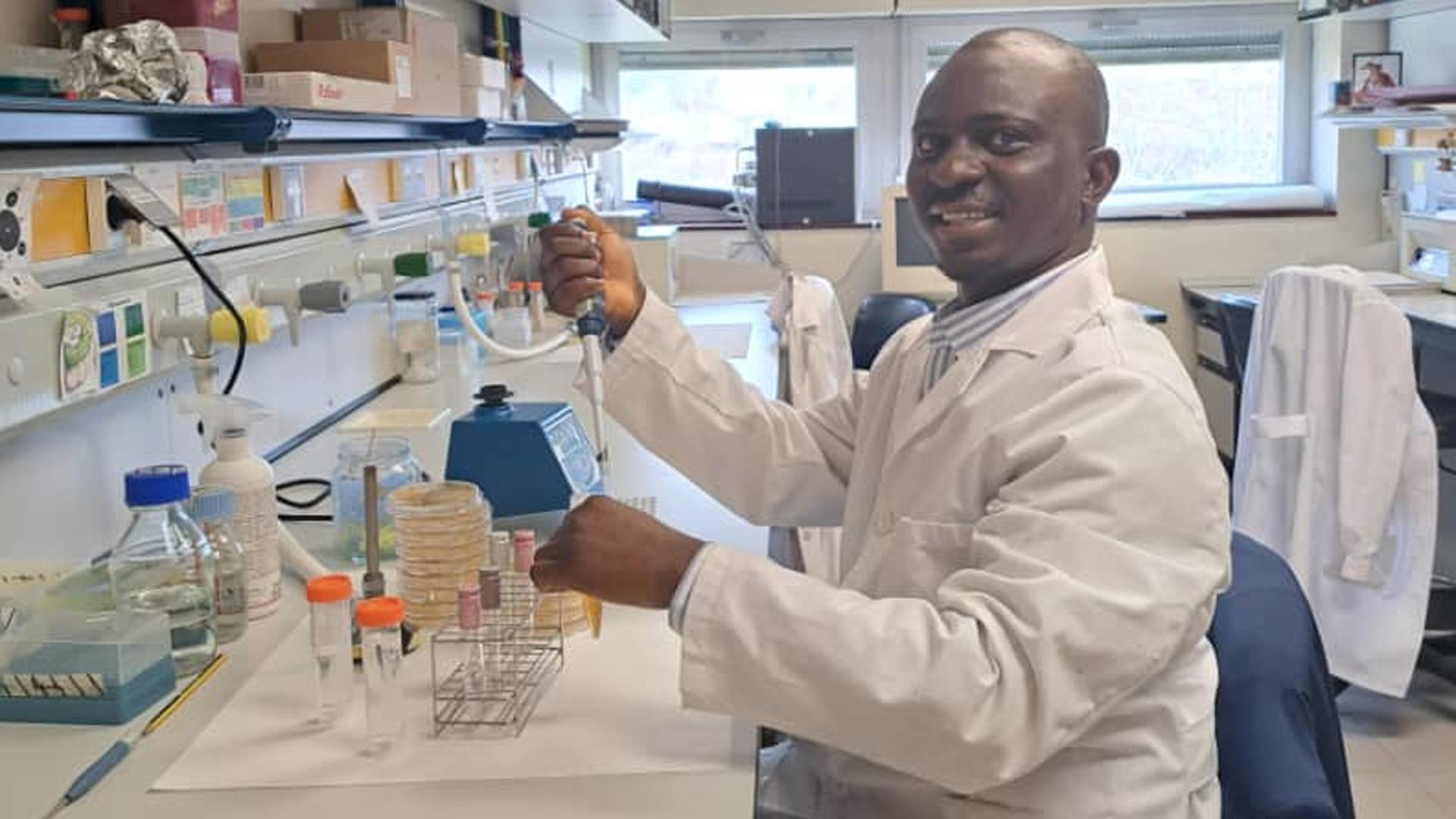Nigerian microbiologist Rine Christopher Reuben is testing the ability of microorganisms to shield farm animals from infectious diseases. Through his studies, he wants to replace or, at least, reduce the use of antibiotics in animal husbandry.
But his project needed funding, and that’s where TWAS-BMBF's financial support opened up new possibilities. Reuben's research, ongoing since 2021, is receiving support from TWAS’s Seed Grant for New African Principal Investigators (SG-NAPI) programme, an initiative fully funded by The German Ministry of Education and Research (BMBF).

Nigeria's population is swiftly growing and, according to FAO projections, will reach almost 400 million in 2050. This will cause a rise in the demand for livestock products and an increase in the use of antibiotics to keep the animals healthy and productive. The widespread use of antibiotics in agriculture makes microbes stronger, posing a public health threat to the human populace. So, through his research, Reuben is determined to help alleviate the antimicrobial resistance menace in Nigeria.
"The TWAS-BMBF grant is a game changer for me: it adds much value to my work, allowing me to run impactful research," he said. "A major challenge for scientists in the developing world is research funding. I trust that my project can lead to the improvement of livestock performance for safe and sustainable food production, not just in Nigeria but worldwide.”
The SG-NAPI programme is a TWAS-BMBF joint initiative launched to strengthen the scientific skills of African countries lagging in science and technology. Early-career researchers—in particular from UN-identified Least Developed Countries—working at institutes lacking laboratory facilities find the support they need. With this grant, they can purchase scientific equipment and consumables, and hire master’s degree students for the project.

Exploiting the power of probiotics
Probiotics are live microorganisms like bacteria and yeasts that provide beneficial nutritional or health effects to the host, both human and animal, when included in the creature’s diet. They are obtained from milk and milk derivatives, fermented foods, plants, humans, and animals.
Along with their scientifically documented health benefits, some probiotics have an antibiotic-like effect and therefore could become allies to protect an organism from infections.
"We are isolating and testing probiotic microorganisms obtained from unconventional sources, including a variety of Nigerian fermented foods and animals, such poultry, pigs, goats, sheep, and cattle," said Reuben.
The idea is to identify indigenous probiotics that could act as growth promoters for animals, and natural therapeutics to control and treat animal diseases. "This will reduce the spread of infectious diseases across species, enhance sustainable food production, and mitigate the public health concerns associated with the use of antibiotics in animal production," he added.
Reuben is a researcher and a lecturer in the Department of Biological Sciences, Anchor University, in Lagos, Nigeria. His drive to find indigenous probiotics as biological therapeutic drugs and growth promoters stems from his commitment to help the Nigerian population dispose of safe and sustainable food production.

"The use of antibiotics in livestock production has caused significant public health problems worldwide," he explained." We face unprecedented spread of antibiotic resistance pathogens in both livestock and humans, with reportedly high amounts of drug residues in products such as eggs, meat, and milk. These antibiotics alter the gut microbial population (called microbiota), causing allergies, and even metabolic disorders," he explained.
According to Reuben, his research would reduce the global emergence of antibiotic resistance, lowering infections and hospitalization rates. It would also contain the spread of antibiotic-resistant microbes that humans may acquire when they eat food of animal origin. Probiotic activity can also benefit people by adding diversity to the bacteria found in their guts.
Studies have confirmed a tight correlation between livestock diseases and the rise of antibiotic resistance, due to drug overuse and misuse in animal production. Some farmers, in fact, administer antibiotics without precise knowledge of the dosage and properties of each drug. In doing so, they inadvertently select bacteria that are strong enough to resist that antibiotic, thriving undisturbed within humans and animals, and contaminating the environment.
"Finding a sustainable biocontrol strategy for the treatment and prevention of diseases in livestock production, enhancing food safety and security, would drive Nigeria towards a better future. We would achieve the goal of some SDGs, in particular, 2 and 3: zero hunger and securing good health and well-being," Reuben said.
From farm to fork
Reuben and his team, including three master's students that he hired with SG-NAPI funds, are now screening many potential probiotic candidates. From a first list of over 800 lactic acid-producing bacteria, they have come up with a selection of about 70 promising strains with interesting properties.

"We have set up lab models to test the antibiotic-like activity of the selected strains. First, we select a source from which the microorganisms can be isolated. Then, microorganisms are assessed for their antibiotic-like activity against different pathogens of public health concern," Reuben said.
Once they spot an interesting component, the scientists start investigating its properties and mechanisms of action, which in most cases are unknown. "Knowing whether a probiotic disrupts just the membrane, or rather the cell wall of a bacterium is important, as it allows to orient the use of specific molecules against specific pathogen families," he explained.
This project has fueled new collaborations, and Reuben has now partners in Germany, Bangladesh, and the US. In the future, he plans to establish connections with the Nigerian government: "Nigeria, and in general sub-Saharan Africa, need cost-effective, safe, and sustainable alternatives to antibiotics," Reuben said. "I hope to become a point of reference for this kind of issues, and put my knowledge at the service of policy-makers to advise them in the compilation of effective guidelines on the use of antibiotics and probiotics."
Thanks to the grant he has received, Reuben has already published an article in the peer-reviewed journal International Microbiology. He has five more articles in the pipeline, which he hopes to publish by the end of this project.
Cristina Serra

